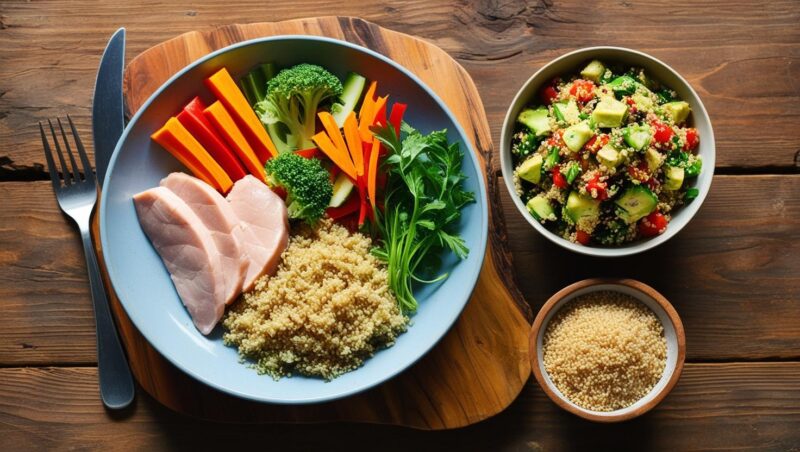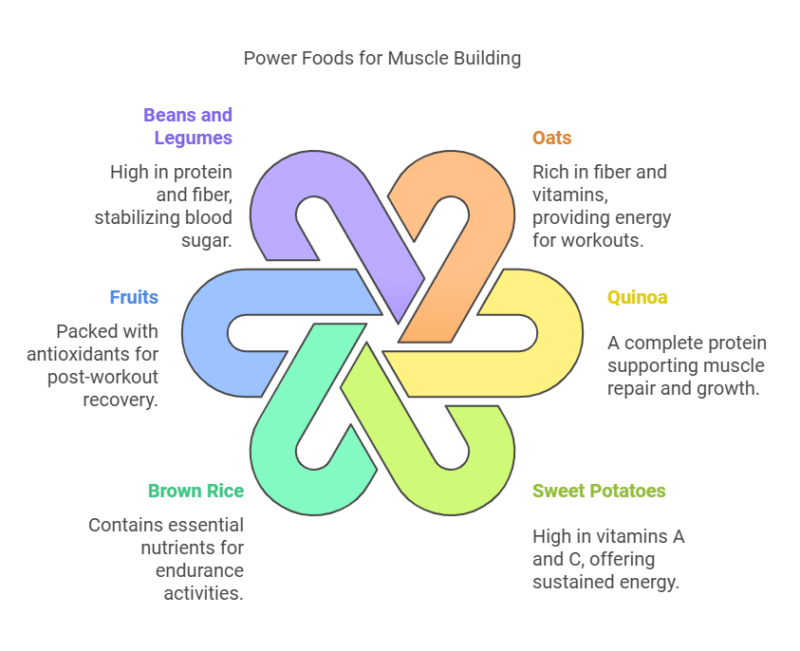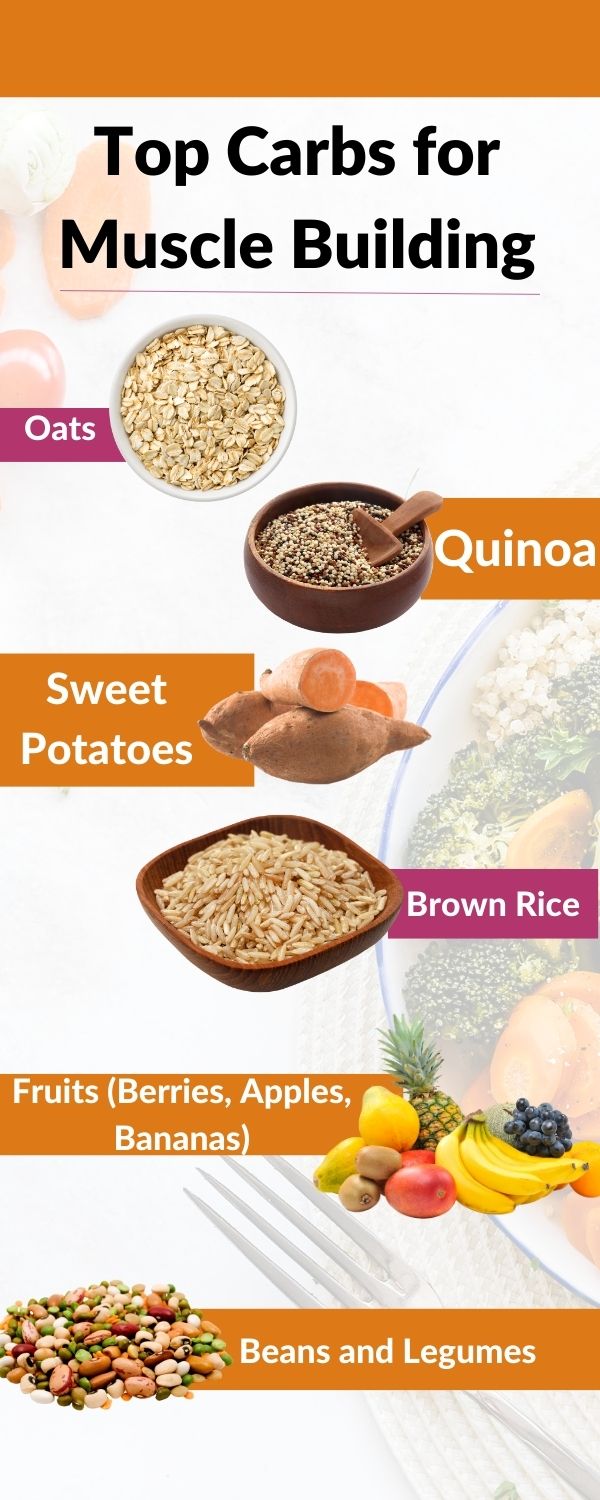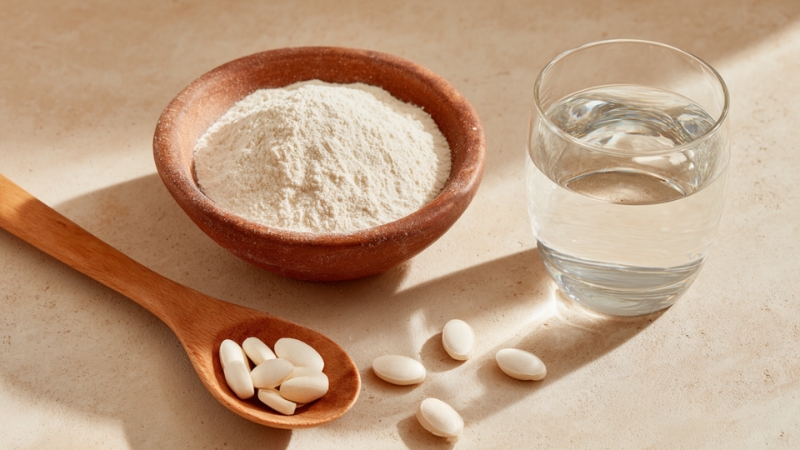
Share Post:
According to nutrition experts, carbs play a dual role in our fitness journey. First, they provide the energy needed to power through a tough workout. More importantly, they help with recovery and growth by replenishing glycogen stores and increasing insulin levels, which in turn, aids in transporting nutrients into muscle cells.
It’s not about loading up on any carbs you can find, it’s about choosing the right ones that align with your health and fitness goals. By selecting carbs that offer a slow release of energy, you can avoid the spikes and crashes in blood sugar that can derail your performance and recovery.
Table of Contents
ToggleWhat Makes a ‘Good’ Carb?
It’s important to distinguish between carbs that will support your muscle-building ambitions and those that might set you back. Experts state that good carbs generally come with a low to moderate glycemic index (GI), meaning they provide a slower and more sustained release of energy.
They’re also typically packed with fiber, which helps keep your digestive system on track and your appetite in check.
Top Carbs for Muscle Building
Let’s break down some top carbohydrate choices that can be a part of a muscle-building diet without ruining your nutritional goals.
1. Oats
Nutritional Value: According to a study, they’re rich in fiber, particularly beta-Lucas, and packed with vitamins and minerals.
Muscle Building Benefits: Provides a steady release of energy for longer, more effective workouts.
Oats are a fantastic breakfast choice; they keep you full and are versatile enough to be paired with protein-rich foods like yogurt or a scoop of protein powder. They also contain antioxidants and other beneficial compounds that can help reduce inflammation, making them a great choice for post-workout recovery.
2. Quinoa
Nutritional Value: A complete protein in itself, which means it contains all nine essential amino acids.
Muscle Building Benefits: Its balanced amino acid profile supports muscle repair and growth.
Quinoa is great for a post-workout meal as it combines the necessary proteins and carbs. It is also gluten-free, making it a fantastic option for those with gluten sensitivities or celiac disease, ensuring that everyone has access to a powerful, muscle-building food.
3. Sweet Potatoes
Nutritional Value: According to FoodData Central, high in vitamins A and C, which are vital for overall health and immune function.
Muscle Building Benefits: The natural sweetness satisfies cravings with a healthy twist, providing energy without spiking blood sugar levels.
Incorporate sweet potatoes in your meals as a mash, baked fries, or simply roasted. Their natural sweetness and nutrient density make them a superior carb choice, providing not just energy but also essential vitamins that promote eye health and immune function.
4. Brown Rice

Nutritional Value: Contains essential nutrients like magnesium, phosphorus, and B vitamins.
Muscle Building Benefits: Offers sustained energy release, which is ideal for long-lasting endurance activities.
Brown rice is a staple carb source that can be easily incorporated into various meals, making it a practical choice for consistent muscle fueling. It’s also beneficial for heart health due to its high fiber content, which can help lower cholesterol levels.
5. Fruits (Berries, Apples, Bananas)
Nutritional Value: Packed with antioxidants, vitamins, fiber, and natural sugars.
Muscle Building Benefits: The fructose found in fruits helps replenish glycogen stores efficiently post-workout.
While fruit is often avoided in low-carb diets, in moderate amounts, it’s perfect for recovery and energy boosting. The antioxidants in fruits like berries can also help reduce oxidative stress and inflammation, aiding in quicker recovery and better health.
6. Beans and Legumes
Nutritional Value: High in protein, fiber, and low-GI carbs.
Muscle Building Benefits: The fiber content helps maintain a feeling of fullness and stabilizes blood sugar levels.
Beans are not only good for muscle building but also for maintaining a healthy weight and metabolism. They can be a fantastic addition to salads, soups, and stews, providing a hearty, satisfying element that supports both muscle growth and overall health.

Incorporating Carbs into Your Diet
Understanding how to integrate these carbs into your diet effectively ensures you reap all the benefits without overindulging. Here are a few tips:
- Pre-Workout: Opt for a mix of complex carbs like oatmeal or brown rice about two to three hours before your session to ensure a steady energy supply.
- Post-Workout: After exercising, include a carb source like quinoa or sweet potatoes along with a protein to help repair and grow muscle tissue.
- Throughout the Day: Keep your energy levels balanced by incorporating smaller portions of carbs in each meal, focusing on low-GI options. This helps prevent energy dips and spikes, keeping your metabolism steady and supportive of your muscle-building goals.
In Summary
Carbohydrates are not the enemy (like many people think). If you select the right types and time their intake around your workouts, you can enhance your muscle-building efforts and stay on track with your diet. It’s all about smart choices that support both your performance and your health.
Sources
- NCBI – Clinical and Physiological Perspectives of β-Glucans: The Past, Present, and Future
- FDC – Sweet potato, cooked, baked in skin, flesh, with salt
- NCBI – Carbohydrate, fat, and protein metabolism in muscle and in the whole body after mixed meal ingestion
- HSPH Harvard – Nutrition news: The good and bad of carbohydrates
Related Posts:
- Top 18 Strangest Gym Injuries You Won't Believe Happened
- How a Clean Diet and Regular Exercise Can Help…
- 10 Booty Building Ankle Weight Workout
- 10 Top Effective Techniques For Building Strong Forearms
- Muscle Recovery Explained - What Happens Inside Your…
- Is Your Workout Causing Your Acne? Here's How to Stop It













